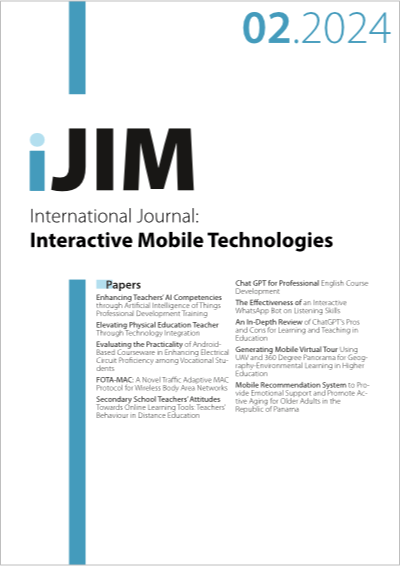Secondary School Teachers’ Attitudes Towards Online Learning Tools: Teachers’ Behaviour in Distance Education
DOI:
https://doi.org/10.3991/ijim.v18i02.44749Keywords:
online learning tools, distance education, emotional experience, high school teachersAbstract
Secondary school teachers’ attitudes towards online learning tools have been modified by systemic measures adopted in the school network as a result of COVID-19. This unexpected crisis situation forced schools to quickly implement digital infrastructure and look for optimal methods of online education. The aim of this study is to investigate on which factors (gender, age and subject area taught) the use of online tools for teaching activities depends. The aim is also to explore the subjective emotional experience of teachers when using online tools and the reasons of their perceived stress in distance education in the Covid era. The factors influencing the use of online tools for teaching, teachers’ subjective emotional experiences of using online tools, and the reasons for teachers’ perceived burden in distance education in the COVID era are analyzed using Welch’s ANOVA test and Games-Howell’s Post-Hoc test. The correlation values focused on teachers’ perceived feelings using online teaching tools are calculated by Pearson’s correlation coefficient. The results are directed towards the level of teachers’ emotional experience in the context of using online tools for the respective activity. Satisfaction and well-being are experienced by teachers when explaining, activating students, assigning written work, and providing information resources. The study identified a major problem in education, which is the use of online tools for oral examinations. Another problem is the integration of homework into online education. The study has practical impact on the integration of teachers’ digital competences. A holistic approach should be developed in teacher training, seeking to fully integrate digital competences, and social and health aspects should also be taken into account.
Downloads
Published
How to Cite
Issue
Section
License
Copyright (c) 2023 Kateřina Berková, Katarína Krpálková Krelová, Pavel Krpálek, Tereza Vacínová, Andrea Kubišová

This work is licensed under a Creative Commons Attribution 4.0 International License.



